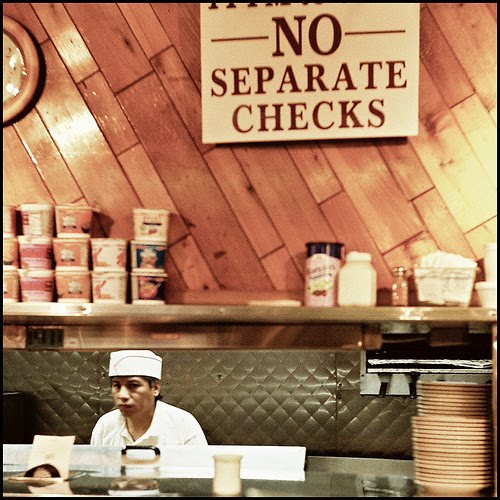
Perhaps it’s time for a refresher on the financial etiquette of eating out.
Yes, splitting a check is okay.
No, you should not shame someone for how much he or she leaves as a tip.
Let’s start with asking for separate checks.
If I’m eating out with a large group, I always ask the server at the beginning of the meal to provide me with a separate check. Typically, others chime in that they, too, want one. But every once in a while, there is that one person who feels the need to say that splitting the check is a sign of being cheap.
I generally don’t bristle at being called cheap because I am a proud penny pincher. But when someone calls another person cheap for asking for a separate check, it’s most definitely intended to demean.
Splitting a check is not some character flaw. It’s usually the result of repeatedly having to subsidize people who order round after round of drinks and pricey menu items, only to be the first to suggest the check be split evenly among all the diners.
Here’s how to divide a check so friendships aren’t frayed.
●Ask for separate checks before ordering. Make no apologies. Ignore rude comments.
●If the restaurant limits splits or won’t allow separate checks, decide as a group how to take care of the bill at the start of the meal. Drinkers will pay for their own booze, for example. Remind table mates that their split should include taxes and tip. If there’s one check, no one leaves until the calculation of what’s owed is settled.
●There are plenty of payment apps — such as Venmo and Apple Pay Cash — that can help diners divide the check.
Now, let’s address people who take it upon themselves to berate restaurant customers who choose to leave a small tip or no tip. Set aside your opinion about tipping. Consider what’s happening in this situation.
It’s none of your business how someone spends his or her money. Such was the case recently when a New Jersey lawmaker went on Twitter to humiliate a customer who left a 74-cent tip on a $119.26 tab.
Sen. Declan O’Scanlon Jr. (R-N.J.) was shown a copy of a customer’s receipt with the tiny tip. O’Scanlon took it upon himself to post it in a tweet that showed the diner’s full name and the last four digits of his debit card number.
After calling the customer a “jerk,” he went on to write, “Ashley is a great waitress and wonderful human being.”
I’ve chosen to withhold the name of the customer, who claims he received poor service, so as not to repeat the offense of outing him for what he felt was a justified tip — right or wrong.
Ashley, the waitress, may have been understandably upset about the tip amount, but she should not have shared private customer information with anyone outside of the restaurant establishment. She crossed a line that should grant privacy to patrons.
By the way, I feel the same way when there are stories about extraordinary tippers. Such largesse shouldn’t be made public. I realize the recipient is often so moved by the big-heartedness of a diner that he or she wants to announce it to the world — these days via Facebook or Twitter. But the disclosure has the effect of minimizing the rest of the tipping public who give within established guidelines.
After all, truth be told, tipping is supposed to be voluntary, and therefore the now-customary 18 percent or 20 percent gratuity is generous, too. So here are some guidelines for tipping.
●It’s not fair that diners are put in the position of supplementing people’s pay regardless of the quality of service. But tipping is part of the price of dining at a restaurant. (You might be interested to know O’Scanlon voted against legislation that would raise the minimum wage in New Jersey to $15 an hour by 2024.)
●If you’re not getting good service, respectfully let your server know. Give the person an opportunity to turn things around. If service is still bad, then politely inform the manager. If issues aren’t resolved, you have the right to tip accordingly.
●Do not tip-shame people. The wait staff should get a living wage so their pay isn’t determined by the generosity — or lack thereof — of customers. But demeaning a diner for not tipping well doesn’t put you on a higher moral ground. It’s ill-mannered.
Whether it’s dividing the bill or tipping your server, make sure that kindness is on the menu.
























